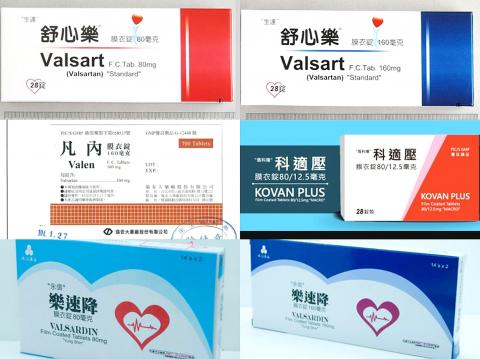Six types of prescription drugs for treating heart disease and hypertension registered under Taiwanese pharmaceutical companies are being recalled as a precaution, as they could contain a probable carcinogen, the Food and Drug Administration (FDA) said yesterday.
The announcement came after governments in Hong Kong, Macau, the UK and several other countries ordered recalls of anti-hypertensive drugs containing valsartan produced by Zhejiang Huahai Pharmaceutical Co Ltd (浙江華海製藥公司) in China.
N-nitrosodimethylamine, a chemical classified as a probable human carcinogen based on laboratory test results, was detected in the valsartan.

Photo: CNA
The FDA on Saturday said that the recalled products registered under pharmaceutical company Actavis Generics were not imported to Taiwan.
However, after a preliminary examination of drugs containing valsartan that are registered in Taiwan, it discovered that six products contain valsartan from Huahai Pharmaceutical Co.
The products being recalled are: Valsart FC Tablet 160mg and Valsart FC Tablet 80mg registered to Standard Chemical and Pharmaceutical Co Ltd (生達化學製藥); Kovan Plus Coated Tablets 80/12.5mg registered to Macro Co Ltd (瑪科隆); Valsardin Film Coated Tablet 160mg and Valsardin Film Coated Tablet 80mg registered to Yung Shin Pharmaceutical Industrial Co (永信藥品); and Valen FC Tablet 160mg registered to Purzer Pharmaceutical Co Ltd (瑞安大藥廠).
The six products that are being recalled account for about 3 to 4 percent of their category in Taiwan, so the majority of heart disease patients do not have to panic, FDA official Chi Jo-feng (祁若鳳) said.
Healthcare facilities and pharmacies have been told to recall the products within a month, the FDA said, adding that patients taking the recalled drugs should not to stop taking them, but rater see a doctor as soon as possible for an alternative prescription.

The High Prosecutors’ Office yesterday withdrew an appeal against the acquittal of a former bank manager 22 years after his death, marking Taiwan’s first instance of prosecutors rendering posthumous justice to a wrongfully convicted defendant. Chu Ching-en (諸慶恩) — formerly a manager at the Taipei branch of BNP Paribas — was in 1999 accused by Weng Mao-chung (翁茂鍾), then-president of Chia Her Industrial Co, of forging a request for a fixed deposit of US$10 million by I-Hwa Industrial Co, a subsidiary of Chia Her, which was used as collateral. Chu was ruled not guilty in the first trial, but was found guilty

DEADLOCK: As the commission is unable to forum a quorum to review license renewal applications, the channel operators are not at fault and can air past their license date The National Communications Commission (NCC) yesterday said that the Public Television Service (PTS) and 36 other television and radio broadcasters could continue airing, despite the commission’s inability to meet a quorum to review their license renewal applications. The licenses of PTS and the other channels are set to expire between this month and June. The National Communications Commission Organization Act (國家通訊傳播委員會組織法) stipulates that the commission must meet the mandated quorum of four to hold a valid meeting. The seven-member commission currently has only three commissioners. “We have informed the channel operators of the progress we have made in reviewing their license renewal applications, and

Taiwan People’s Party (TPP) Chairman Huang Kuo-chang (黃國昌) yesterday appealed to the authorities to release former Taipei mayor Ko Wen-je (柯文哲) from pretrial detention amid conflicting reports about his health. The TPP at a news conference on Thursday said that Ko should be released to a hospital for treatment, adding that he has blood in his urine and had spells of pain and nausea followed by vomiting over the past three months. Hsieh Yen-yau (謝炎堯), a retired professor of internal medicine and Ko’s former teacher, said that Ko’s symptoms aligned with gallstones, kidney inflammation and potentially dangerous heart conditions. Ko, charged with

Taiwan-based publisher Li Yanhe (李延賀) has been sentenced to three years in prison, fined 50,000 yuan (US$6,890) in personal assets and deprived political rights for one year for “inciting secession” in China, China's Taiwan Affairs Office spokesman Chen Binhua (陳斌華) said today. The Shanghai First Intermediate People’s Court announced the verdict on Feb. 17, Chen said. The trial was conducted lawfully, and in an open and fair manner, he said, adding that the verdict has since come into legal effect. The defendant reportedly admitted guilt and would appeal within the statutory appeal period, he said, adding that the defendant and his family have